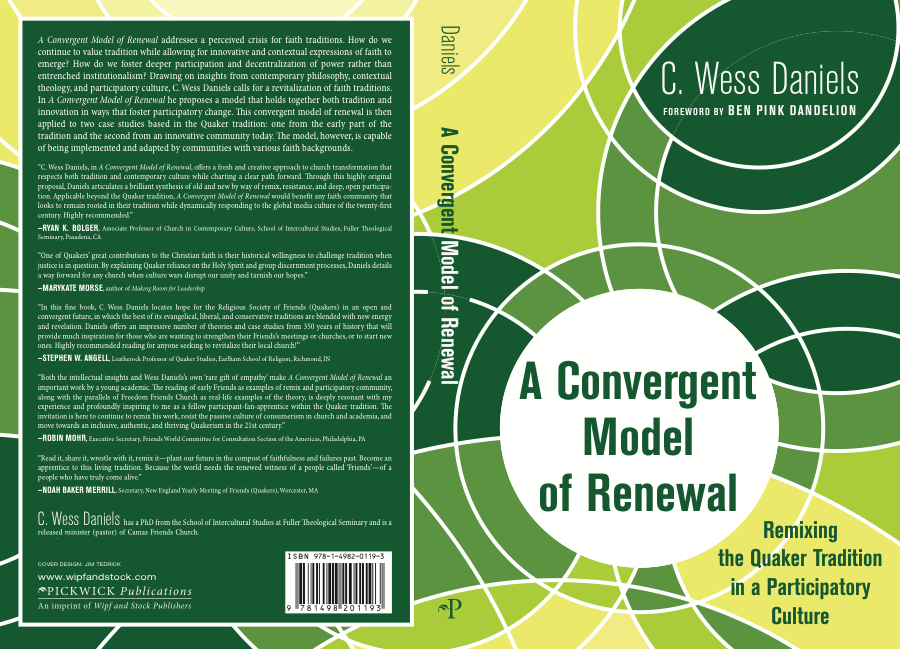A Convergent Model of Renewal: Remixing the Quaker Tradition in a Participatory Culture (2015)
By C. Wess Daniels published by Pickwick Publications

Now Available at Pickwick Publications & Amazon.com in print and as an ebook.
This book is for those interested in renewing their faith tradition in ways that are contextually appropriate and driven by practices from participatory culture rather than institutional-focused, top-down or based on deficit change models.

Download a free excerpt from the book
“In 1970, Everett Cattell, Quaker missionary and ecumenicist, made a clarion call to Friends for the renewal of their church. His vision was that the Friends Church find a future not in simply retrieving the past, or accurately predicting the future, but rather as missionaries…” Click here to download.
Download the Discussion Companion Here
This is printable resource that is sort of like the “graphic novel of the book” and is very helpful in engaging the material, as well as facilitating small group conversations or personal study. Click here to download.
Be a part of the conversation with #convergentbook on twitter
Subscribe for updates: Click here to get email updates.
Endorsements
Dr. Ryan K. Bolger, PHD. Associate Professor of Church in Contemporary Culture School of Intercultural Studies, Fuller Theological Seminary
No model of church renewal has taken the most recent changes in Western culture seriously — until now. C. Wess Daniels, in A Convergent Model of Renewal, offers a fresh and creative approach to church transformation that respects both tradition and contemporary culture while charting a clear path forward. Through this highly original proposal, Daniels articulates a brilliant synthesis of old and new by way of remix, resistance, and deep, open participation. Applicable beyond the Quaker tradition, A Convergent Model of Renewal would benefit any faith community that looks to remain rooted in their tradition while dynamically responding to the global media culture of the Twenty-first century. Highly recommended.
Dr. MaryKate Morse, author and speaker
One of Quakers’ great contributions to the Christian faith is their historical willingness to challenge tradition when justice is in question. By explaining Quaker reliance on the Holy Spirit and group discernment processes, Daniels details a way forward for any church when culture wars disrupt our unity and tarnish our hopes.
Stephen W. Angell, Leatherock Professor of Quaker Studies, Earlham School of Religion
In this fine book, C. Wess Daniels locates hope for the Religious Society of Friends (Quakers) in an open and convergent future, in which the best of its evangelical, liberal, and conservative traditions are blended with new energy and revelation. Daniels offers an impressive number of theories and case studies from 350 years of history that will provide much inspiration for those who are wanting to strengthen their Friends’ meetings or churches, or to start new ones. Highly recommended reading for anyone seeking to revitalize their local church!
Robin Mohr, Executive Secretary, Friends World Committee for Consultation Section of the Americas
Both the intellectual insights and Wess Daniels’ own “rare gift of empathy” make A Convergent Model of Renewal an important work by a young academic. The reading of early Friends as examples of remix and participatory community, along with the parallels of Freedom Friends Church as real-life examples of the theory, is deeply resonant with my experience and profoundly inspiring to me as a fellow participant-fan-apprentice within the Quaker tradition. The invitation is here to continue to remix his work, resist the passive culture of consumerism in church and academia, and move towards an inclusive, authentic and thriving Quakerism in the 21st century.
Noah Baker Merrill, Secretary, New England Yearly Meeting of Friends (Quakers)
Every generation is given a prophetic task: To reach down into the roots of our faith tradition and rediscover what is most vital, and to reclaim and reinterpret that reality in the context of today’s needs. This has never been truer for the Church—and for the Quaker movement—than it is today. In this book, Wess Daniels makes a key contribution to that ongoing, organic work. Read it, share it, wrestle with it, remix it—plant our future in the compost of faithfulness and failures past. Become an apprentice to this living tradition. Because the world needs the renewed witness of a People called “Friends”— of a People who have truly come Alive.
Book Summary
My book, “A Convergent Model of Renewal: Remixing the Quaker Tradition in a Participatory Culture,” is being published by Pickwick Publications this year (2015).
Drawing on insights from philosophy, contextual theology and participatory culture (i.e. Fandom), the book deals with the revitalization of faith traditions and creates a model of renewal that seeks to hold together both tradition and innovation in ways that foster decentralized, participatory change. While using examples from the Quaker tradition it is my hope that this model can be used by people of any faith when thinking about how to reformulate their tradition in new contexts.
Here is a summary of the book:
In the wake of modernity, faith traditions face the challenge of how to adapt within changing cultures, new scientific discoveries, and other pressing realities that bring about crisis. Often the response to revitalization is to eschew tradition altogether or rigidly cling to it. The “convergent model of renewal” proposed here demonstrates how renewal can conserve tradition while being innovative. The model draws on missiology and participatory cultural studies, enabling the construction of a theory that is fully contextual and fosters participation.
In order to construct the model, I draw on the work of philosopher Alasdair MacIntyre, missiologist Stephen Bevans and cultural studies scholar Henry Jenkins. MacIntyre argues that traditions are historically extended arguments that are socially embodied within living communities. At their best, they overcome internal and external crises by drawing on the resources already within their tradition. Bevans emphasizes that all theology is contextual, and that changing contexts necessitate changing theology. Bevan’s synthetic model illustrates how practitioners within a context can be in a dialogue with tradition, culture and praxis. Henry Jenkins demonstrates that within participatory culture, practitioners remix original texts in order to create something new, they work to create authentic experiences, they produce what they want to consume, they share their collective intelligence in ways that are decentralized, and in doing so they embody an alternative social community.
The convergent model draws on these three thinkers to offer a way forward for tradition. Tradition is the only grounds for innovation, context is the catalyst for change and participatory culture provides the practices for holding these two things together. Two examples are presented that demonstrate how the model works: early Quakerism and Freedom Friends Church in Salem, Oregon. Both of these groups remix original texts of their tradition with new texts in a way that innovates while maintaining a continuity with the past, as they resist a passive culture of consumerism in order to foster an authentic subjective experience, drawing on many voices an open work of shared power and knowledge is formed, and by doing so they embody an alternative participatory community.
Speaking About “A Convergent Model”
I would love to come and do a workshop, retreat or participate in other teaching opportunities around topics such as participatory culture, church renewal, remix culture, Quakers, convergent Friends, and/or contextual theology.
Please contact me if that is of interest to you.
Post comments, photos, reviews, etc. to twitter, facebook and instagram #convergentmodel.
Sign up here for email updates about the book, travel and teaching events.
Thank you, Wess Daniels
Credit: pdf. icon